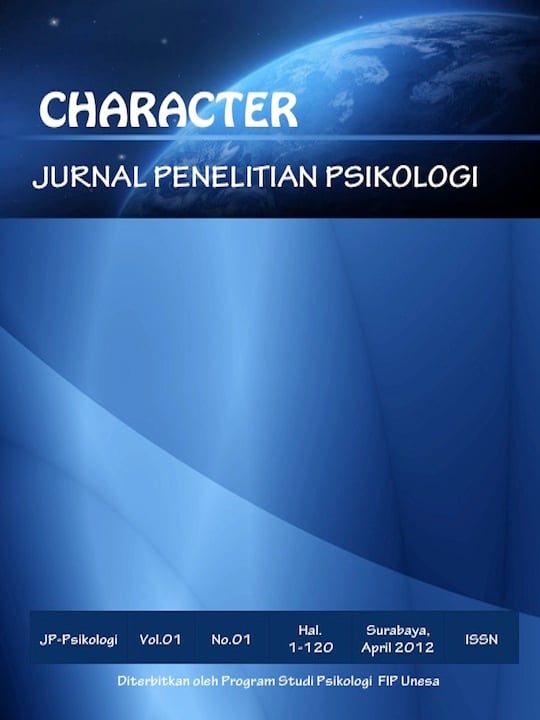HUBUNGAN ANTARA PSYCHOLOGICAL WELL-BEING DENGAN KOMITMEN ORGANISASI PADA GURU
DOI:
https://doi.org/10.26740/cjpp.v8i4.41193Abstract
Abstrak
Penelitian ini bertujuan untuk mengetahui hubungan antara psychological well-being dengan komitmen organisasi pada guru. Penelitian ini menggunakan metode penelitian kuantitatif. Jumlah populasi sebanyak 65 guru dengan menggunakan teknik sampling jenuh sehingga jumlah sampel sebanyak 65 guru. Teknik pengumpulan data dalam penelitian ini menggunakan skala komitmen organisasi dan skala psychological well-being. Analisa data dalam penelitian ini menggunakan teknik korelasi pearson product moment, serta penghitungan dilakukan menggunakan software SPSS versi 24.0 for windows. Nilai taraf signifikansi yang diperoleh yaitu sebesar 0,000 (p<0,05), yang berarti terdapat hubungan yang signifikan antara psychological well-being dengan komitmen organisasi. Hasil analisis data dalam penelitian ini menunjukkan nilai koefisien korelasi yang diperoleh adalah sebesar 0,827 (r=0,827), hal tersebut menunjukkan bahwa korelasi antara psychological well-being dengan komitmen organisasi tergolong dalam hubungan yang sangat kuat. Hasil nilai koefisien korelasi juga menunjukkan nilai positif, artinya hubungan kedua variabel searah sehingga jika variabel psychological well-being mendapatkan nilai yang tinggi maka variabel komitmen organisasi juga akan memiliki nilai yang tinggi. Berlaku sebaliknya, jika variabel psychological well-being memiliki nilai yang rendah, maka variabel komitmen organisasi juga akan memiliki nilai yang rendah pula. Berdasarkan hasil yang diperoleh menunjukkan bahwa terdapat hubungan antara psychological well-being dengan komitmen organisasi pada guru.
Kata Kunci: Komitmen Organisasi, Psychological Well-Being, Guru.
Abstract
This study aims to determine the relationship between psychological well-being and organizational commitment on teacher. This study uses quantitative research methods. Total population is 65 teachers using saturated sampling technique then total sample is 65 teachers. Data collection techniques in this studi uses organizational commitment scale and psychological well being scale. Analysis of the data in this study uses pearson product moment correlation, and calcullation carried out using SPSS version 24.0 software for windows. The significance level value was 0,000 (p<0,05), meaning there was a significant relationship between psyhchological well-being and organizational commitment. The result of data analysis showed the correlation coefficient value obtained was 0,827 (r=0,827), these result showing the correlation between psychological well-being and organizational commitment is classified as vary strong relationship. The result of correlation coefficient also show a positive value, which means that the relationship between the two variables is unidirectional so that if psychological well-being variable has a high value, the organizational commiment variable will also has a high value. Conversely, if the psychological well-being variable has a low value, the organizaional commitment variable also has a low value. Based on result that indicates there is relationship between psychological well-being and organizational commitment on teachers.
Keywords: Organizational Commitment, Psychological Well-Being, Teacher.
Downloads
Downloads
Published
How to Cite
Issue
Section
License
Authors who publish in this journal agree to the following terms:
Copyright in any article is held by the author.
The author grants the journal, publication rights with the work simultaneously licensed under a Creative Commons Attribution License that allows others to share the work with an acknowledgment of the work's authorship and initial publication in this journal.
Authors may enter into separate, additional contractual arrangements for the non-exclusive distribution of the journal's published version of the work (e.g., posting it to an institutional repository or publishing it in a book), with an acknowledgment of its initial publication in this journal.
Authors are permitted and encouraged to post their work online (e.g., in an institutional repository or on their website) prior to and during the submission process, as this can lead to productive exchanges, as well as earlier and greater citation of published work.
 Abstract views: 1178
,
Abstract views: 1178
, PDF Downloads: 1128
PDF Downloads: 1128





